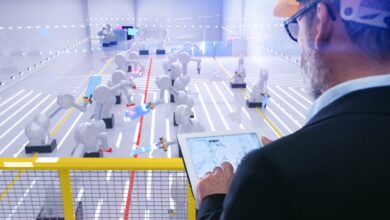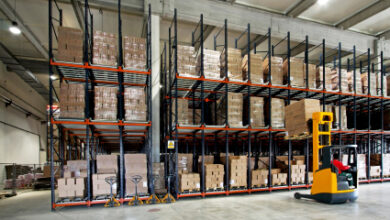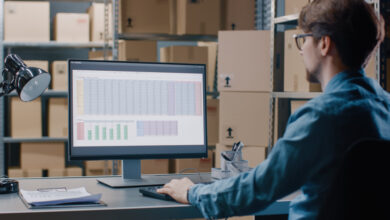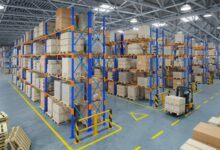If you’re considering automation in your warehouse, here are 10 reasons to rely on a trusted advisor

Warehouse automation has rapidly proliferated worldwide in recent years.
However, globally, only 20-30% of warehouses and distribution centers have any automation system in place. Therefore, you can expect the rapid growth to continue. Long-term annual growth in the warehouse automation sector is expected to be between 10% and 15% by 2030.
What drives the growth of warehouse automation?
A critical factor in this growth is a significant societal shift towards e-commerce, which increases the number of storage tasks required to meet consumer demand. This has intensified competition for the workforce in storage and distribution. As a result, many companies, especially in competitive sectors, struggle to attract, hire, train, and retain the workforce needed to serve their customers. In such an environment, automating warehouses and distribution centers becomes a necessity despite the investment cost, leading to questions such as:
- What type of warehouse automation should I prefer?
- Where can I derive the first and most significant benefit from warehouse automation?
- Can I justify automation, or can my needs be met with more traditional equipment and simple mechanization?
- Whom should I work with to identify solutions tailored to my unique needs?
- How can I manage my risks as I move towards automating my warehouses?
The best approach to addressing these questions is to engage an experienced and trusted advisor in your process. Such advisors will safeguard your interests throughout your warehouse automation journey from start to finish. Here are ten reasons to invite expert advisors as companions.
1. Impartial objectivity
An experienced warehouse automation consultant can provide unbiased guidance towards automation solutions tailored to your unique needs. A consultant will:
- Convert business plans for your distribution facilities into digital and feasible requirements,
- Understand your preferences, constraints, and priorities when evaluating technologies,
- Examine all available technologies that meet your needs without bias or incentives towards specific technology or supplier and add all automation suppliers to your selection menu.
2. Broad knowledge and experience
Solution providers naturally have limited abilities to offer unbiased or experienced views and advice on technologies outside of the options they sell. However, the right consultant has knowledge and experience in evaluating, selecting, and implementing a wide range of warehouse technologies. They enable you to avoid experiencing the same troubles others have faced by sharing lessons learned from past projects.
3. Data-driven assessment
The right consultancy team will combine extensive industry knowledge and experience with a data-driven assessment:
- Current and future volume requirements,
- Functional area, process, and system requirements (and constraints),
- Product handling types and characteristics,
- Reserve areas to be allocated for the future and storage requirements for your existing inventory,
- Customer service level expectations,
- Current and future workforce requirements.
4. Analysis of alternative technologies
When you are not limited to technologies offered by a single supplier or integrator, there is an extremely broad potential range of technologies to consider. Perhaps a combination of different solutions that can be sourced from multiple suppliers, might be precisely suitable for your needs. But which technologies are best for your operation? An expert consultant will quickly narrow down the list of feasible technologies for you and lead the feasibility analysis of each alternative to identify the right technology for your unique needs before evaluating and selecting a pool of technology providers.
5. Business case bias
Ultimately, justifying financial investment for a point application or integrated automation system must be supported by calculating total cost of ownership (TCO) with both quantitative and qualitative benefits. A consultant will manage this analysis on your behalf and ensure it includes inputs from critical stakeholders in your decision-making process.
6. Competitive supplier selection
The aim is to bring together the right technologies with the right suppliers at a reasonable cost. A consultant can manage the supplier and integrator selection process on your behalf. A consultant will:
- Classify and prioritize the list of bidders,
- Determine, develop, and communicate the scope of request for proposals (RFPs),
- Expedite the response process of bidders and facilitate their submissions,
- Evaluate the responses of bidders together with your team.
7. Contract negotiations
After a supplier (or a prioritized list of suppliers) is selected, reaching a mutually beneficial agreement is imperative. A consultant can lead or support negotiations to ensure both parties understand the scope of the project, additional services, scheduling, post-sales support, and commercial terms.
8. Planning commissioning and detailed needs analysis
Once a contract is signed with a solution provider or integrator, your job isn’t done; there’s still a journey to be had in warehouse automation. The next step is to develop detailed commissioning and resource planning and, in parallel, to define the process, system, and equipment requirements associated with your planned automation initiative in more detail. An experienced consultant will assist in developing the commissioning and resource planning required to successfully implement the automation project. They can also organize workshops to identify future process requirements, warehouse management and control system needs, and other engineering and integration tasks.
9. Program management
A warehouse automation investment goes beyond equipment installation. Success requires the coordinated and cross-functional effort of multiple internal and external resources. For example, a consultant can lead the overall program in multiple interlinked workflows and be responsible for managing necessary changes in people, processes, systems, equipment, and the building. And an expert consultant will use tested management methods and tools, unique to them and tested during the implementation of many projects, to manage the sub-detail projects, resources, budgets, changes, risks, outcomes, and communication processes throughout the journey.
10. Risk mitigation
The most significant value of a consultant in your warehouse automation journey is minimizing your risks and designing measures for each risk. Throughout the journey, a consultant will consider your interests when identifying your distribution center’s requirements, evaluating alternative technologies, selecting and negotiating with suppliers, planning commissioning, and managing the overall program to achieve success.
Feeling overwhelmed by the numerous options warehouse automation offers?
Contact us and learn how Dijitalis can assist you in your warehouse automation journey. Our proven consultants work with the best digital technologies (tools, methods, and content) in the field. This provides actionable insights and measurable results throughout your supply chain, no matter how large or complex it may be.
As an example, you can review our completed KORTEKS automated warehouse investment project.





